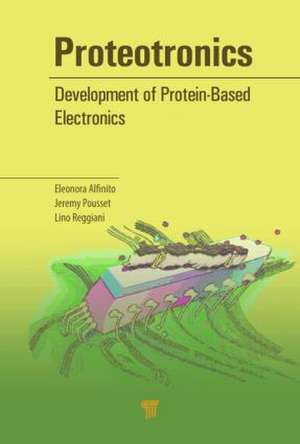Proteotronics: Development of Protein-Based Electronics
Autor Eleonora Alfinito, Jeremy Pousset, Lino Reggianien Limba Engleză Hardback – 14 oct 2015
Preț: 654.48 lei
Preț vechi: 877.66 lei
-25% Nou
Puncte Express: 982
Preț estimativ în valută:
125.25€ • 136.00$ • 105.21£
125.25€ • 136.00$ • 105.21£
Comandă specială
Livrare economică 01-15 aprilie
Doresc să fiu notificat când acest titlu va fi disponibil:
Se trimite...
Preluare comenzi: 021 569.72.76
Specificații
ISBN-13: 9789814613637
ISBN-10: 9814613630
Pagini: 280
Ilustrații: 140 black & white illustrations, 30 colour illustrations
Dimensiuni: 152 x 229 mm
Greutate: 0.54 kg
Ediția:1
Editura: Jenny Stanford Publishing
Colecția Jenny Stanford Publishing
ISBN-10: 9814613630
Pagini: 280
Ilustrații: 140 black & white illustrations, 30 colour illustrations
Dimensiuni: 152 x 229 mm
Greutate: 0.54 kg
Ediția:1
Editura: Jenny Stanford Publishing
Colecția Jenny Stanford Publishing
Public țintă
Academic and PostgraduateCuprins
Preface. Introduction. Sensing Proteins. Electrical Properties: Experiments. Electrical Properties: Theory. Bacteriorhodopsin as Testing Prototype. Survey of Other Proteins. Conclusion and Perspectives. Appendix: Computational Details. List of acronyms. Bibliography. Index.
Recenzii
"This book presents the first structured approach to the new field of protein-based electronics, which has opened possibilities for the development of new concepts of nanobiosensors for health applications. It presents a solid theoretical approach which is validated by the existing experimental evidence, and will be of relevance for both young and experienced researchers who are interested in the frontier between electronics and biology."
— Prof. Joan Bausells, Barcelona Microelectronics Institute (CSIC), Spain
"This book presents a newly emerging discipline, proteotronics, investigating the coupling between the protein world and electronics. It opens the field of protein-based nanobiosensors that are able to bypass the complicated sequence of biological events for signal generation in e-sensing."
— Prof. Nicole Jaffrezic-Renault, Institute of Analytical Chemistry, University of Lyon, France
"Alfinito and her coworkers have made the very first steps of analyzing the electrical transport characteristics of the building elements of potentially important protein-based electronics. Highly recommended reading for all those who are involved with these developments and anybody who is interested in these challenging issues."
— Prof. Lazlo B. Kish, Texas A&M University, USA
— Prof. Joan Bausells, Barcelona Microelectronics Institute (CSIC), Spain
"This book presents a newly emerging discipline, proteotronics, investigating the coupling between the protein world and electronics. It opens the field of protein-based nanobiosensors that are able to bypass the complicated sequence of biological events for signal generation in e-sensing."
— Prof. Nicole Jaffrezic-Renault, Institute of Analytical Chemistry, University of Lyon, France
"Alfinito and her coworkers have made the very first steps of analyzing the electrical transport characteristics of the building elements of potentially important protein-based electronics. Highly recommended reading for all those who are involved with these developments and anybody who is interested in these challenging issues."
— Prof. Lazlo B. Kish, Texas A&M University, USA
Notă biografică
Eleonora Alfinito is a researcher in condensed matter physics at the University of Salento, Lecce, Italy. Her research activity is founded on quantum field theory, physics of matter, and mathematical physics. At present, her main interests concern with the electrical properties of biological matter, proteins in particular, and the statistical characterization of electrical fluctuations.
Jeremy Pousset is a researcher at the Institute for Microelectronics and Microsystems of the National Research Council, Lecce, Italy. His research activity has been devoted to the problem of terahertz plasma waves in nano-devices and the development of Monte Carlo codes and the investigation of electron transport modelling of biological matter. Currently, he is working on the electrical characterization of organic materials.
Lino Reggiani is full professor in physics of matter at the University of Salento, where he is carrying out a research activity finalized to the study of electrical properties and fluctuations to characterize materials and devices to be used in nano-electronics and in the development of sensors. He has authored and co-authored over 500 scientific publications in specialized international magazines.
Jeremy Pousset is a researcher at the Institute for Microelectronics and Microsystems of the National Research Council, Lecce, Italy. His research activity has been devoted to the problem of terahertz plasma waves in nano-devices and the development of Monte Carlo codes and the investigation of electron transport modelling of biological matter. Currently, he is working on the electrical characterization of organic materials.
Lino Reggiani is full professor in physics of matter at the University of Salento, where he is carrying out a research activity finalized to the study of electrical properties and fluctuations to characterize materials and devices to be used in nano-electronics and in the development of sensors. He has authored and co-authored over 500 scientific publications in specialized international magazines.
Descriere
This book aims to review a variety of experiments devoted to the investigation of charge transport in proteins and present a unified theoretical model to interpret macroscopic results in terms of the amino-acid backbone structure of a single protein. The purpose of this book is to serve a broad audience of researchers involved in the field of electrical characterization of biological materials and in the development of new molecular devices based on proteins, such as nanometric biological sensors of new generation. The book serves as a reference platform as it surveys the existing data and presents the basis for future development of a new branch of nanoelectronics, called proteotronics.
